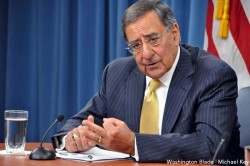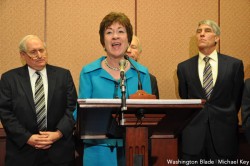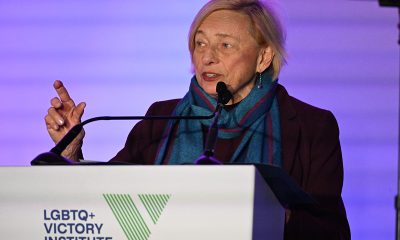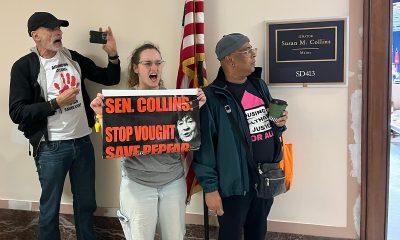National
Demise of ‘Don’t Ask’ celebrated, but questions linger
Pentagon, lawmakers herald end of military’s gay ban
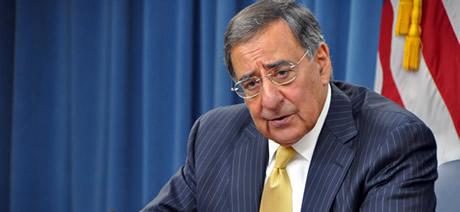
Top Pentagon leaders and lawmakers celebrated the end of “Don’t Ask, Don’t Tell” this week as questions about the impact of the law’s repeal persist for gay service members.
Defense Secretary Leon Panetta said during a news conference that the end of “Don’t Ask, Don’t Tell” is “an historic day for the Pentagon and for the nation.”
“As secretary of defense, I am committed to removing all of the barriers that would prevent Americans from serving their country and from rising to the highest level of responsibility that their talents and capabilities warrant,” Panetta said. “These are men and women who put their lives on the line in the defense of this country, and that’s what should matter the most.”
Panetta said more than 97 percent of the 2.3 million men and women in the armed forces have received education and training on handling open service. The training started after President Obama signed repeal legislation in December.
Chairman of the Joint Chiefs of Staff Adm. Mike Mullen, who was likely making his final appearance before the media in his role before stepping down from his position Oct. 1, recalled the testimony he gave before the Senate in February 2010 in favor of repeal.
“I believed then, and I still believe, that it was first and foremost a matter of integrity; that it was fundamentally against everything we stand for as an institution to force people to lie about who they are just to wear a uniform,” Mullen said. “We are better than that. We should be better than that.”
Hours earlier, U.S. senators who were among the 65 who voted for repeal held a separate news conference to commemorate the end of “Don’t Ask, Don’t Tell.” Sens. Joseph Lieberman (I-Conn.) and Susan Collins (R-Maine), the original co-sponsors of the repeal legislation, were joined by Senate Armed Services Committee Chair Carl Levin (D-Mich.), Mark Udall (D-Colo.), Chris Coons (D-Del.) and Kirsten Gillibrand (D-N.Y.).
Lieberman said the effort to repeal “Don’t Ask, Don’t Tell” in Congress was one of the most satisfying and thrilling experiences he’s had as a senator.
“In our time, I think the front line of the civil rights movement is to protect people in our country from discrimination based on sexual orientation — all the more so when it comes to the United States military, whose mission is to protect our security so we can continue to enjoy the freedom and equal opportunity under law,” Lieberman said.
Collins read aloud a postcard she received in July after her committee vote in favor of “Don’t Ask, Don’t Tell” repeal from someone in Afghanistan who signed the note anonymously as “an Army soldier.” The postcard thanks Collins for her vote as a Republican and pledges to repay the vote “with continued professionalism.”
“This touches me so much for two reasons,” Collins said. “One, that this Army soldier deployed in Afghanistan took the time to write to thank me for my leadership. But second, it is so poignant that he couldn’t sign his name. He had to write, ‘an Army soldier,’ and today he can sign his name, and that makes all the difference.”
Amid the celebrations over the end of “Don’t Ask, Don’t Tell” at these news conferences, questions emerged about how to extend greater benefits to LGBT service members.
Only half the senators at the news conference — Udall, Gillibrand and Coons — are co-sponsors of legislation that would repeal the Defense of Marriage Act, which prohibits same-sex marriage. Collins, Lieberman and Levin aren’t co-sponsors of the legislation known as the Respect for Marriage Act.
Collins left the news conference at the start of the question-and-answer period. In response to a question from the Washington Blade, Levin affirmed his support for the Respect for Marriage Act, while Lieberman offered qualified support.
The Connecticut senator said he had issues with the “full faith and credit” portion of the Respect for Marriage Act enabling federal benefits to flow to married gay couples even if they live in a state that doesn’t recognize same-sex marriage.
“I do support it in part — I think we’ve got to celebrate what we’ve done today — I certainly support it in regard to discrimination in federal law based on sexual orientation,” Lieberman said.
During the Pentagon news conference, one reporter asked about possible guards against troops opposed to open service attempting to undermine it by committing acts of harassment or violence against gays.
Panetta said the military has “zero tolerance” for harassment and the command structure in place should address any such behavior.
“My hope is that the command structure operating with … the standard disciplines that are in place will implement those disciplines and will ensure that harassment doesn’t take place and that all behavior is consistent with the discipline and the best interests of our military,” Panetta said.
Some advocates have said the chain of command doesn’t provide sufficient protection against discrimination for gay service members — particularly if the discrimination is coming from a commanding officer — and have called on Obama to sign an executive order barring discrimination in the armed forces on the basis of sexual orientation and gender identity.
Another lingering question is whether military chaplains can officiate at same-sex weddings and if base facilities can be used for such ceremonies in states where same-sex marriage is legal.
A Navy memo dated April 13 affirmed that chaplains could officiate at same-sex weddings and base facilities could be used for this purpose, but this guidance was rescinded after an outcry from social conservatives. Guidance on the matter has yet to be reissued.
Following the Pentagon news conference, Defense Department General Counsel Jeh Johnson took questions from the media, and, in response to a question from the Blade, said such guidance clarifying the rules is forthcoming.
“We are very, very close to having a resolution of that issue,” Johnson said. “It’s something I’ve been working on myself. … We’re pretty much done and there should be something issued to the chaplain community and others very, very soon on that.”

The Comings & Goings column is about sharing the professional successes of our community. We want to recognize those landing new jobs, new clients for their business, joining boards of organizations and other achievements. Please share your successes with us at [email protected].
Congratulations to Gil Pontes III on his recent appointment to the Financial Advisory Board for the City of Wilton Manors, Fla. Upon being appointed he said, “I’m honored to join the Financial Advisory Board for the City of Wilton Manors at such an important moment for our community. In my role as Executive Director of the NextGen Chamber of Commerce, I spend much of my time focused on economic growth, fiscal sustainability, and the long-term competitiveness of emerging business leaders. I look forward to bringing that perspective to Wilton Manors — helping ensure responsible stewardship of public resources while supporting a vibrant, inclusive local economy.”
Pontes is a nonprofit executive with years of development, operations, budget, management, and strategic planning experience in 501(c)(3), 501(c)(4), and political organizations. Pontes is currently executive director of NextGen, Chamber of Commerce. NextGen Chamber’s mission is to “empower emerging business leaders by generating insights, encouraging engagement, and nurturing leadership development to shape the future economy.” Prior to that he served as managing director of The Nora Project, and director of development also at The Nora Project. He has held a number of other positions including Major Gifts Officer, Thundermist Health Center, and has worked in both real estate and banking including as Business Solutions Adviser, Ironwood Financial. For three years he was a Selectman, Town of Berkley, Mass. In that role, he managed HR and general governance for town government. There were 200+ staff and 6,500 constituents. He balanced a $20,000,000 budget annually, established an Economic Development Committee, and hired the first town administrator.
Pontes earned his bachelor’s degree in political science from the University of Massachusetts, Dartmouth.
Kansas
ACLU sues Kansas over law invalidating trans residents’ IDs
A new Kansas bill requires transgender residents to have their driver’s licenses reflect their sex assigned at birth, invalidating current licenses.

Transgender people across Kansas received letters in the mail on Wednesday demanding the immediate surrender of their driver’s licenses following passage of one of the harshest transgender bathroom bans in the nation. Now the American Civil Liberties Union is filing a lawsuit to block the ban and protect transgender residents from what advocates describe as “sweeping” and “punitive” consequences.
Independent journalist Erin Reed broke the story Wednesday after lawmakers approved House Substitute for Senate Bill 244. In her reporting, Reed included a photo of the letter sent to transgender Kansans, requiring them to obtain a driver’s license that reflects their sex assigned at birth rather than the gender with which they identify.
According to the reporting, transgender Kansans must surrender their driver’s licenses and that their current credentials — regardless of expiration date — will be considered invalid upon the law’s publication. The move effectively nullifies previously issued identification documents, creating immediate uncertainty for those impacted.
House Substitute for Senate Bill 244 also stipulates that any transgender person caught driving without a valid license could face a class B misdemeanor, punishable by up to six months in jail and a $1,000 fine. That potential penalty adds a criminal dimension to what began as an administrative action. It also compounds the legal risks for transgender Kansans, as the state already requires county jails to house inmates according to sex assigned at birth — a policy that advocates say can place transgender detainees at heightened risk.
Beyond identification issues, SB 244 not only bans transgender people from using restrooms that match their gender identity in government buildings — including libraries, courthouses, state parks, hospitals, and interstate rest stops — with the possibility for criminal penalties, but also allows for what critics have described as a “bathroom bounty hunter” provision. The measure permits anyone who encounters a transgender person in a restroom — including potentially in private businesses — to sue them for large sums of money, dramatically expanding the scope of enforcement beyond government authorities.
The lawsuit challenging SB 244 was filed today in the District Court of Douglas County on behalf of anonymous plaintiffs Daniel Doe and Matthew Moe by the American Civil Liberties Union, the ACLU of Kansas, and Ballard Spahr LLP. The complaint argues that SB 244 violates the Kansas Constitution’s protections for personal autonomy, privacy, equality under the law, due process, and freedom of speech.
Additionally, the American Civil Liberties Union filed a temporary restraining order on behalf of the anonymous plaintiffs, arguing that the order — followed by a temporary injunction — is necessary to prevent the “irreparable harm” that would result from SB 244.
State Rep. Abi Boatman, a Wichita Democrat and the only transgender member of the Kansas Legislature, told the Kansas City Star on Wednesday that “persecution is the point.”
“This legislation is a direct attack on the dignity and humanity of transgender Kansans,” said Monica Bennett, legal director of the ACLU of Kansas. “It undermines our state’s strong constitutional protections against government overreach and persecution.”
“SB 244 is a cruel and craven threat to public safety all in the name of fostering fear, division, and paranoia,” said Harper Seldin, senior staff attorney for the ACLU’s LGBTQ & HIV Rights Project. “The invalidation of state-issued IDs threatens to out transgender people against their will every time they apply for a job, rent an apartment, or interact with police. Taken as a whole, SB 244 is a transparent attempt to deny transgender people autonomy over their own identities and push them out of public life altogether.”
“SB 244 presents a state-sanctioned attack on transgender people aimed at silencing, dehumanizing, and alienating Kansans whose gender identity does not conform to the state legislature’s preferences,” said Heather St. Clair, a Ballard Spahr litigator working on the case. “Ballard Spahr is committed to standing with the ACLU and the plaintiffs in fighting on behalf of transgender Kansans for a remedy against the injustices presented by SB 244, and is dedicated to protecting the constitutional rights jeopardized by this new law.”
National
After layoffs at Advocate, parent company acquires ‘Them’ from Conde Nast
Top editorial staff let go last week

Former staff members at the Advocate and Out magazines revealed that parent company Equalpride laid off a number of employees late last week.
Those let go included Advocate editor-in-chief Alex Cooper, Pride.com editor-in-chief Rachel Shatto, brand partnerships manager Erin Manley, community editor Marie-Adélina de la Ferriére, and Out magazine staff writers Moises Mendez and Bernardo Sim, according to a report in Hollywood Reporter.
Cooper, who joined the company in 2021, posted to social media that, “Few people have had the privilege of leading this legendary LGBTQ+ news outlet, and I’m deeply honored to have been one of them. To my team: thank you for the last four years. You’ve been the best. For those also affected today, please let me know how I can support you.”
The Advocate’s PR firm when reached by the Blade said it no longer represents the company. Emails to the Advocate went unanswered.
Equalpride on Friday announced it acquired “Them,” a digital LGBTQ outlet founded in 2017 by Conde Nast.
“Equalpride exists to elevate, celebrate and protect LGBTQ+ storytelling at scale,” Equalpride CEO Mark Berryhill said according to Hollywood Reporter. “By combining the strengths of our brands with this respected digital platform, we’re creating a unified ecosystem that delivers even more impact for our audiences, advertisers, and community partners.”
It’s not clear if “Them” staff would take over editorial responsibilities for the Advocate and Out.

